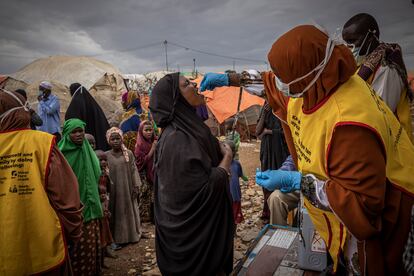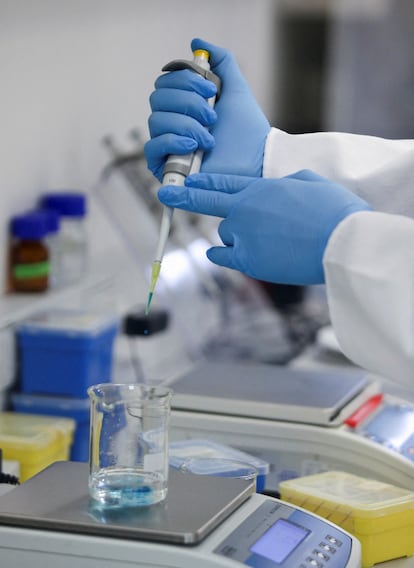African nations bet on mRNA technology to break dependency on foreign-made vaccines
Around 99% of doses that are administered on the continent are imported. To address this problem, vaccine manufacturing facilities in Senegal, Rwanda, and South Africa are showing interest in a technology that reduces production costs and gets around patent barriers

The hoarding of vaccines by Northern countries during the Covid-19 pandemic brought to the table the bloody reality of Africa’s vaccine dependence, where 99% of the doses administered come from outside the continent. To gain autonomy, a handful of countries, including Senegal, South Africa and Rwanda, launched a frantic race to build vaccine production centers. However, the patents and intellectual property thereof, in the hands of large pharmaceutical companies, continued to limit African capacity for action. To break this bond, the continent is betting on messenger RNA (mRNA) technology, much cheaper and easier to transfer than classic vaccines, tested on a large scale and successfully during Covid-19 and considered revolutionary by experts.
“The difference between a messenger RNA vaccine and a more traditional vaccine is that today it is possible, from a virus and the protein, to design in two weeks an RNA sequence [a complementary molecule of DNA that does almost all the work of life] so that when you administer it to someone, their cells produce the antigen. The person is the reactor that makes the vaccine. That is a revolution because the only thing any country needs is for someone to teach them how to do it, while with traditional vaccines there is a huge intellectual property barrier based on the virus,” says José Castillo, manager of Quantoom Biosciences, a company specialized in this technology based in Belgium.
For three days, world experts in health and new technologies, scientists and entrepreneurs, managers and representatives of research and innovation centers, have met at the Abdou Diouf conference center in Diamniadio, near Dakar, within the framework of the Grand Challenges initiative promoted by the Bill and Melinda Gates Foundation. This series of annual meetings, which aims to stimulate the search for solutions to global health problems, was born two decades ago, during which the aforementioned foundation and its partners have subsidized 3,800 projects in 118 countries for a total value of about 1.5 billion euros.
This Monday, Bill Gates himself, co-president of the foundation, announced in Dakar an aid of 37.7 million euros to facilitate access to Quantoom Biosciences’ low-cost mRNA research and manufacturing platform. The Pasteur Institute of Dakar — which will open a vaccine production center in the coming years, called Madiba — and Biovac, a South African research institute, will receive 4.7 million each to acquire the technology that will allow them to manufacture vaccines adapted to the local context. Another 18.8 million will go to the Quantoom platform, while the remaining 9.4 million will be distributed among other vaccine production centers in poor or middle-income countries.
“Developing our capacity to discover and manufacture mRNA vaccines adapted to Africa is an important and necessary step towards vaccine self-sufficiency in the region,” said Dr. Amadou Sall, head of the Pasteur Institute in Dakar. “We are pleased with this new financing that will favor the development of vital technologies on the continent, contributing to global health security thanks to a growth in the supply and access to immunizations, which will allow us to achieve greater health equality in the world,” he added.

mRNA technology — whose creators have just won the Nobel Prize in Medicine — is considered a revolution, especially in dealing with infectious diseases, such as tuberculosis, malaria or Lassa fever, which affect populations in the poorest countries. Thanks to it, research and manufacturing costs can be lowered and, therefore, made more accessible. “By putting innovative mRNA technology in the hands of researchers and producers in Africa and around the world, more people will benefit from next-generation vaccines,” affirms Dr. Muhammad Ali Pate, Nigeria’s minister of health. “Innovation can be transformative,” agrees Morena Makhoana, head of the South African Biovac Institute, “but only if it’s accessible to the people who need it most.”
Quantoom Biosciences is working on modular mRNA technology that reduces the production costs of this type of vaccines by up to 50% compared to the traditional mRNA that companies such as Moderna are making. However, to produce these vaccines, it will be necessary to have highly-qualified experts — who can support countries that have a training deficit — or large laboratories, thus allowing for the decentralization of production. This social interest — compatible with economic profitability — is what has allowed the Bill and Melinda Gates Foundation to subsidize Quantoom’s project.
“We’re transferring knowledge,” says Castillo, the manager at Quantoom. “I also believe that one of the ways to stop the tragedy of emigration is to do this, to allow countries to develop and be masters of their own research. Nowadays, many companies transfer knowledge to manufacturers, but the virus vials stay in their country. They send the vaccines wholesale to Africa and bottle them here. That’s ok, but the fundamental value is in research and development,” he emphasizes. “The only thing needed is that transfer of capabilities, so that, say, the Pasteur Institute in Dakar can have [ownership] over the RNA sequences that they’re going to design.”
Sign up for our weekly newsletter to get more English-language news coverage from EL PAÍS USA Edition
Tu suscripción se está usando en otro dispositivo
¿Quieres añadir otro usuario a tu suscripción?
Si continúas leyendo en este dispositivo, no se podrá leer en el otro.
FlechaTu suscripción se está usando en otro dispositivo y solo puedes acceder a EL PAÍS desde un dispositivo a la vez.
Si quieres compartir tu cuenta, cambia tu suscripción a la modalidad Premium, así podrás añadir otro usuario. Cada uno accederá con su propia cuenta de email, lo que os permitirá personalizar vuestra experiencia en EL PAÍS.
¿Tienes una suscripción de empresa? Accede aquí para contratar más cuentas.
En el caso de no saber quién está usando tu cuenta, te recomendamos cambiar tu contraseña aquí.
Si decides continuar compartiendo tu cuenta, este mensaje se mostrará en tu dispositivo y en el de la otra persona que está usando tu cuenta de forma indefinida, afectando a tu experiencia de lectura. Puedes consultar aquí los términos y condiciones de la suscripción digital.









































